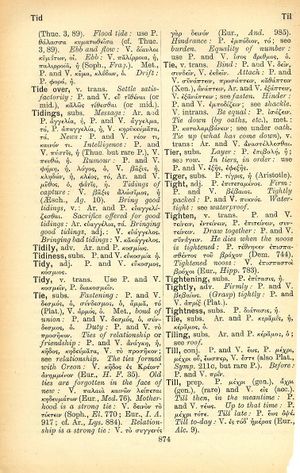tie
English > Greek (Woodhouse)
subs.
Fastening: P. and V. δεσμός, ὁ, σύνδεσμος, ὁ, ἅμμα, τό (Plat.), V. ἁρμός, ὁ.
Met., bond of union: P. and V. δεσμός, ὁ, σύνδεσμος, ὁ.
Duty: P. and V. τὸ προσῆκον.
Ties of relationship or friendship: P. and V. ἀνάγκη, ἡ, κῆδος, κηδεύματα, V. τὸ προσῆκον; see relationship.
The ties formed with Creon: V. κῆδος ἐς Κρέοντʼ ἀνημμένον (Eur., H. F. 35).
Old ties are forgotten in the face of new: V. παλαιὰ καινῶν λείπεται κηδευμάτων (Eur., Med. 76).
Motherhood is a strong tie: V. δεινὸν τὸ τίκτειν (Soph., El. 770; Eur., I. A. 917; cf. Ar., Lys. 884).
Relationship is a strong tie: V. τὸ συγγενὲς γὰρ δεινόν (Eur., And. 985).
Hindrance: P. ἐμπόδιον, τό; see burden.
Equality of number: use P. and V. ἴσος ἄριθμος, ὁ.
v. trans.
Bind: P. and V. δεῖν, συνδεῖν, V. ἐκδεῖν.
Attach: P. and V. συνάπτειν, προσάπτειν, καθάπτειν (Xen.), ἀνάπτειν, Ar. and V. ἐξάπτειν,V. ἐξανάπτειν; see fasten.
Hinder: P. and V. ἐμποδίζειν; see shackle.
V. intrans. Be equal: P. ἰσάζειν.
Tie down (by oaths, etc.), met.: P. καταλαμβάνειν; see under oath.
Tie up (what has come down), v. trans.: Ar. and V. ἀναστέλλεσθαι.

